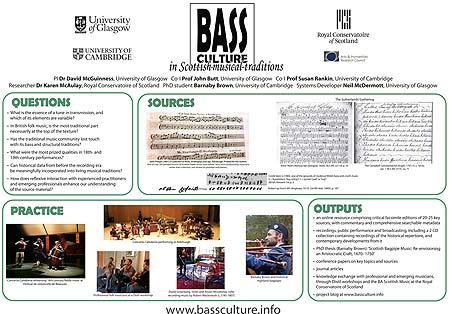I’m just back from another quick trip to London to visit the RMA conference. All week I’ve had one of those colds where you never know what your symptoms are going to be from day to day: fever, catarrhy throat, headache, sniffles, total lethargy, any of the above. So I’m still operating on reduced power after a night on the sleeper on Thursday and the late train home last night.
This was my first experience of a big grown-up academic conference, and Barnaby and I had been invited to go and stand in front of our bass culture poster in the hope that people would engage us in conversation (which some did). He was then dashing back to Cambridge to go to a party dressed as Axl Rose: I’ve seen the photo but I’m not sharing it.

Anyhow, it was a chance for me to sit in on some papers and hear what musicologists get up to these days. And some of it was dull, some of it was badly presented, some of it was so caught up in its own self-reflexive post-modern subjectivities that it wasn’t about anything at all … BUT there was also some real mental stimulation on offer, which was great, and some of that was from my Glasgow colleagues which was even better.
The morning started with Eva Moreda on Spanish and Catalan exiles and whether they appear in Spanish musical history, which brought up all kinds of useful questions about what ‘Scottish’ music is. As soon as you identify a culture with a nation state, lots of subtle distinctions appear about what’s considered in and what’s out. There are thousands of present-day examples, but an old one I came across recently was Nathaniel Gow in his 1823 Ancient Curious Collection of ‘Genuine Scotch Tunes’ including John come kiss me now, with the top line taken entirely from Bremner’s Curious Collection of the 1750s, who took it from Playford’s The Division Violin of 1685, and there’s nothing particularly Scottish about the tune anyway: ask William Byrd.
After a great diversion from Anastasia Belina-Johnson on the life of André Tchaikowsky, who’s most famous for giving his skull to the RSC, but was really far more interesting than that, I headed for the session on ‘the implicit listener’ which is one of those topics that has the potential to immediately disappear up its own fundament. Fortunately our very own John Butt was around to root the discussion in some actual music. Early music people have a tendency to bang on about being faithful to the composer’s intentions, but John was arguing (if I picked him up right) that this has the danger of conferring god-like status on the composer, and it can be more interesting to consider what the composer, musicians, and audience were actually listening to, when one person’s intentions may have been abandoned for something else when put into a real musical situation. Given that music is about listening rather than necessarily about making sounds, this makes lots of sense to me, and also chimed well with a great paper given later by Miguel Ángel Marin on ‘centre and periphery’. When people play Corelli violin sonatas, the general assumption is that it’s a good idea to try and play them the way Corelli might have: we fetishise the original performance or the original circumstances of performance. But there are so many other historical possibilities too, some of them documented in great musical detail, and some not, such as Niel Gow enjoying Corelli’s music in Inver. Why not try to play Corelli as it may have been heard in rural Perthshire rather than in Rome? (Incidentally, Elizabeth Ford has found Niel Gow’s copy of McGibbon’s Scots Tunes in the Library of Congress, but that’s another story.)

Also, within five minutes yesterday afternoon I met two people that I hadn’t seen for over 25 years, so hello again to Barbara (who recognised me first) and Helen (who I recognised first).
There was just time before heading for the last train north to buy some new technology, so I put aside my anti-Apple ideology for a moment and invested in an iPad mini and Logitech keyboard. Basically I’m still in search of a device which is as beautifully designed, ergonomic and useful as my old Psion 5mx, with its pocket-sized clam shell shape, almost full-size keyboard, and touch screen. It can’t be entirely insignificant that I’ve chosen to type this on an 8 year old Dell laptop running Windows XP, and not on anything running iOS7. I’m not a Luddite; I just like things that are satisfying to hold and touch as well as to look at. Apple have never quite got to grips (literally) with that …
